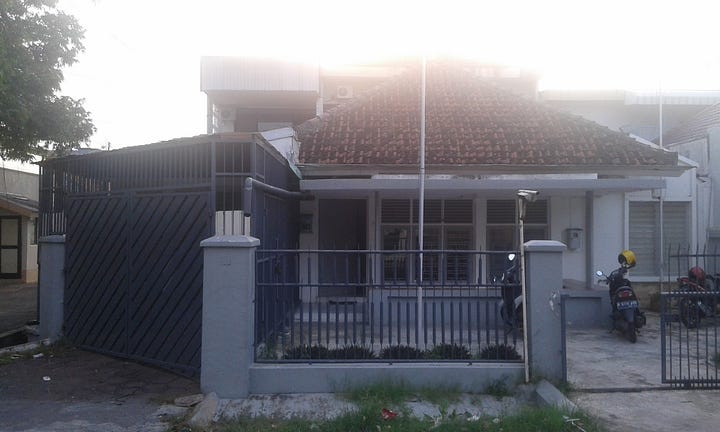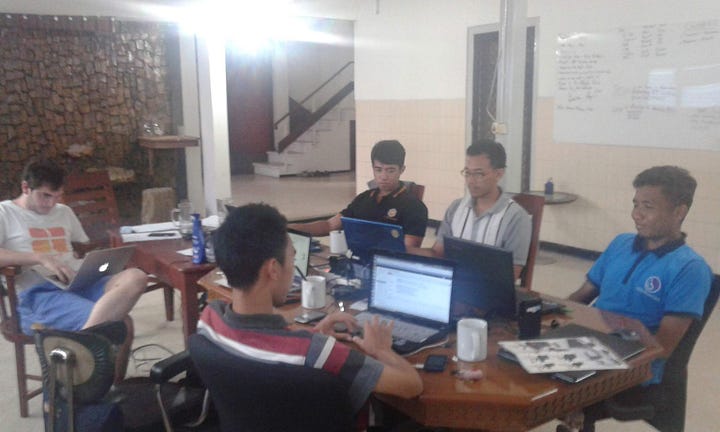Starting this newsletter, and simplifying our organization
#1 - From a garage to 10 countries, and 14 companies to 5 regions.
Hi,
Welcome to issue #1 of Odoo Trailblazer, our journey to become the #1 Odoo partner.
I’m very happy to share this first episode, but, to be honest, I’m also scared. So please share your feedback to help me improve!
Odoo is the enterprise software we install for our clients. As in the open-source world, they give the community 80% of their intellectual properties for free: source code, training material, etc.
With this new weekly newsletter, we will join their mindset and share 80% of the stories and secrets of our entrepreneurial journey.
Agenda
Our journey and why this newsletter
Simplifying our organization
From a garage in Indonesia to 10 countries
Three benefits we got from scaling internationally
The hidden cost of complexity
Cutting 14 small businesses, creating five regions
Next steps
1. Our journey and why this newsletter?
Port Cities was born in Indonesia in 2015 to help companies to use Odoo in the archipelago.


This was Port Cities’ garage office in Semarang, 2015. All six employees lived in the house at the time.
We then expanded to 10 countries and raised our ambition to become the #1 Odoo partner” worldwide.
Over the last seven years, we got 100s of unique stories: by growing superfast, selling to an Indonesian tiny business one day, and pitching to a large corporation the day after. We set up all business departments (finance, HR, marketing, sales, …) without institutional investors or enough experience.
We also learned to survive wartime: recessions, recovery from our own business failure, and execution of lay-off plans to avoid bankruptcy.
It is worth many MBAs for us, and we are trying to give it back to the community.
But above all, we are on a mission to become the #1 Odoo partner worldwide. It is very hard, and it is statistically likely to fail. Sharing our targets and progress with the community will make us accountable.
Last but not least, we can not succeed without your encouragement, feedback, and business advice.
Read also “building in public” by Mario Gabriele.
2. Simplifying our organization
a. From a garage in Indonesia to 10 countries
We launched our business in Semarang as I was living there, and had pre-launch hot leads. Unfortunately, Semarang is a second-tier city in Indonesia, a developing country, so it was hard at the time to convince SMEs to invest in enterprise software.
Why? The typical blue-collar salary was about USD 100 per month at the time it used to be much less, so it was not the mindset to optimize labour costs.
To understand how rich is a country, you can check the nominal GDP per capita on Wikipedia, it’s a measure of the yearly revenue or spending by citizen. It helps to assess if they could afford your products and get an ideas about the price levels.
So, I took a 6-hour train to Jakarta to meet some potential clients. We officially opened in Jakarta in January 2015, and our revenue tripled in just six months.
We were in a “frenzy” and started to think about expanding internationally.
We opened an office in Malaysia and then in Vietnam, Singapore, Mexico, Australia, and Japan, either because some of our employees wanted to or to follow strategic clients.
b. Three benefits we got from scaling internationally
Growing that fast internationally was a bit crazy, but it brought many benefits to us:
Give new opportunities to key employees, and increase retention.
Follow clients: to open a new country to initially serve a large client, we could grow fast with limited investment.
We entered developed markets, ready to pay a higher daily rate and with a mindset to invest in quality enterprise software.
Ultimately, it contributed to growing faster than most Odoo partners worldwide.
Above all, it was exciting.
c. The hidden cost of complexity
Diversifying your business, growing internationally, or expanding any new ways, generally have a lot of underestimated costs.
Here were the bad effects for us:
We lost focus, and we would have managed three businesses better than in 10 countries.
Increased overheads due to localization: tax reporting, legal documents, marketing languages, and many other components of the business need to be localized.
Increased management overheads: we had to organize meetings, visit, control, and support ten businesses, and even if you get some economy of scale, it takes significantly more time than controlling one business.
We lost a bit of our culture as ten business leaders worldwide don’t communicate as well as ten people in the same office.
The faster you grow, the more inefficiencies you create, and the more investment you need. If you grow fast, optimize for simplicity.
Once you grow, you usually need to build your middle management and your supporting departments (HR, finance, marketing, etc.).
Unfortunately, our budget was allocated to have one or two business managers in many countries, and they still had to do everything like in start-ups.
Today we have a fast-growing business, but our overheads are a bit too high, and our management is not as strong as it could be. How do we fix it?
d. Cutting 14 small businesses, creating five regions
In 2023 we started to merge all our 14 businesses into five regions, with five management teams; so if there are three countries in a region, they would actually manage it like one business.
For example, our new business “Southeast Asia” will include our Center of Excellence (Semarang), Port Cities Indonesia (Jakarta), Port Cities Malaysia, and Port Cities Singapore.
All responsibilities and KPIs are now regional.
What are our objectives?
Reduce overheads: one person would be in charge of the finance for one region, and one person would need to report about finance to the group team. It saves time and overheads on two sides.
Improve management quality: now we will manage five much bigger businesses, so they would afford to have more serious management.
Replace solo leaders or duos with true (management) teams that support each other.
We still didn’t regret our decision to expand internationally, but if we had to start over, we would do it differently:
Grow a few bigger countries
Organize our group like one (small) company until each country gets big enough.
3. Next steps for our business
Execute the organizational changes: assign new responsibilities, help leaders to cope with the changes, and build new reporting tools.
Finalize our strategic plan for 2023.
See you next week!
Please share your feedback, what you want to hear about next week or any business advice.
To know more about Port Cities, Odoo, our services: https://portcities.net
Follow us on LinkedIn for more updates: Gaspard, the CEO, or our company page

